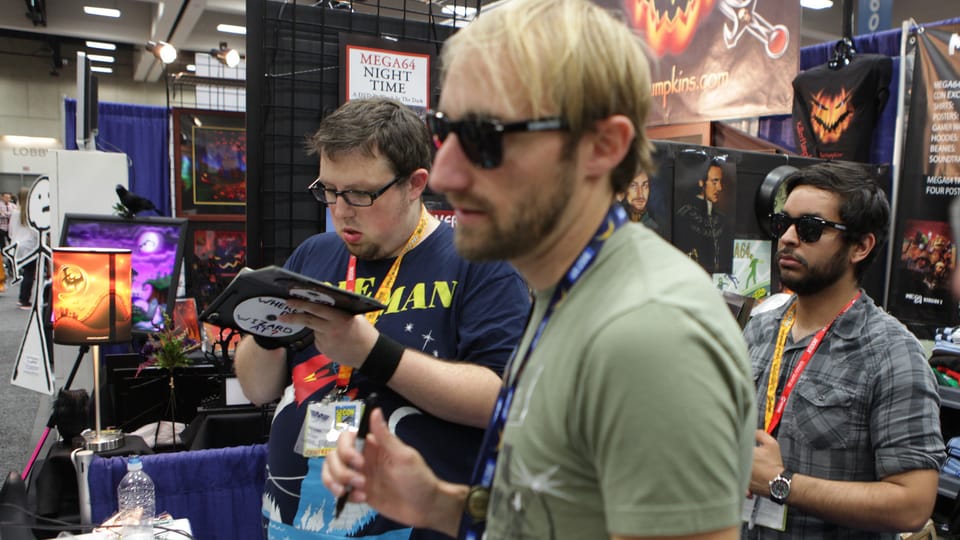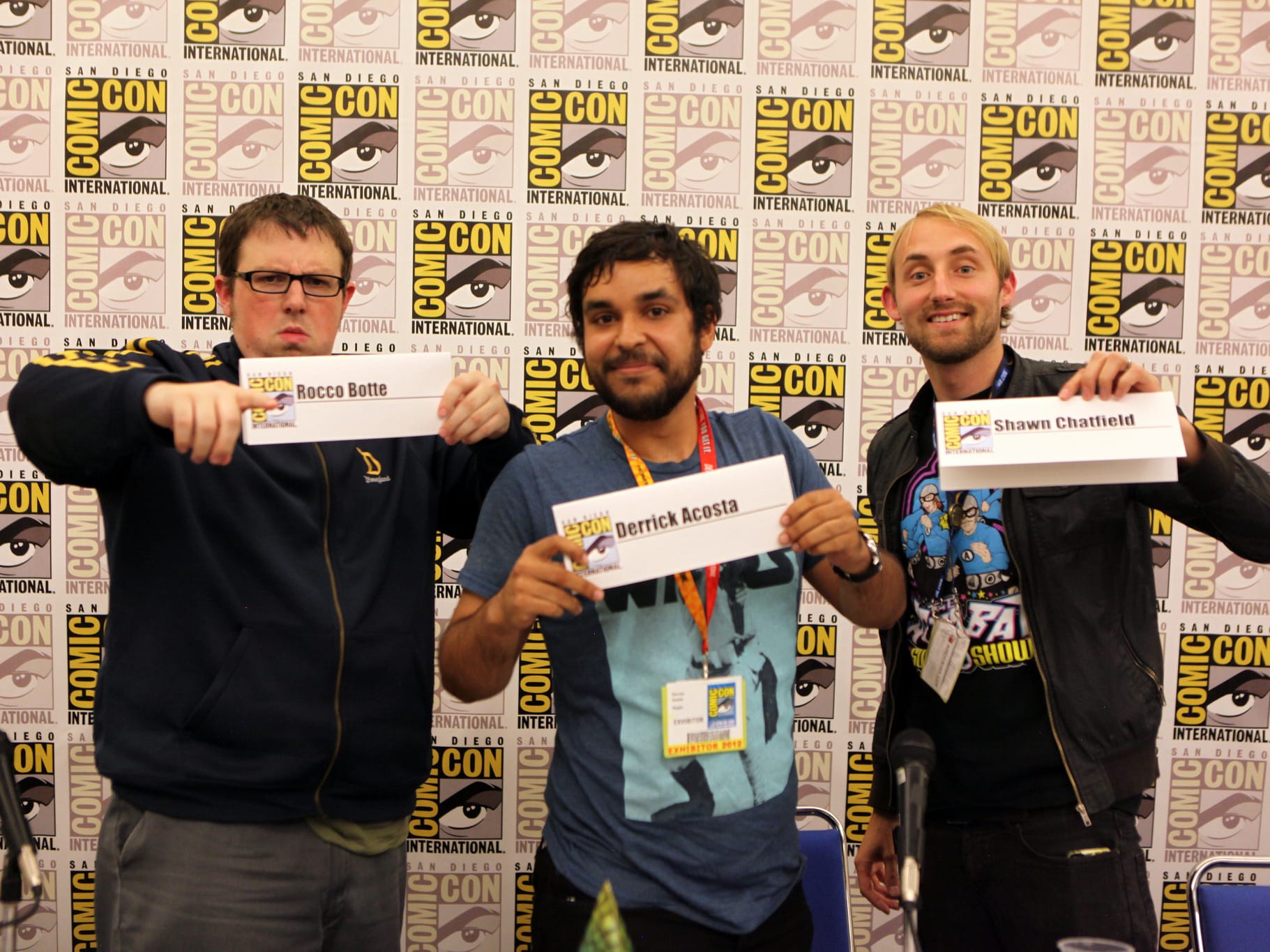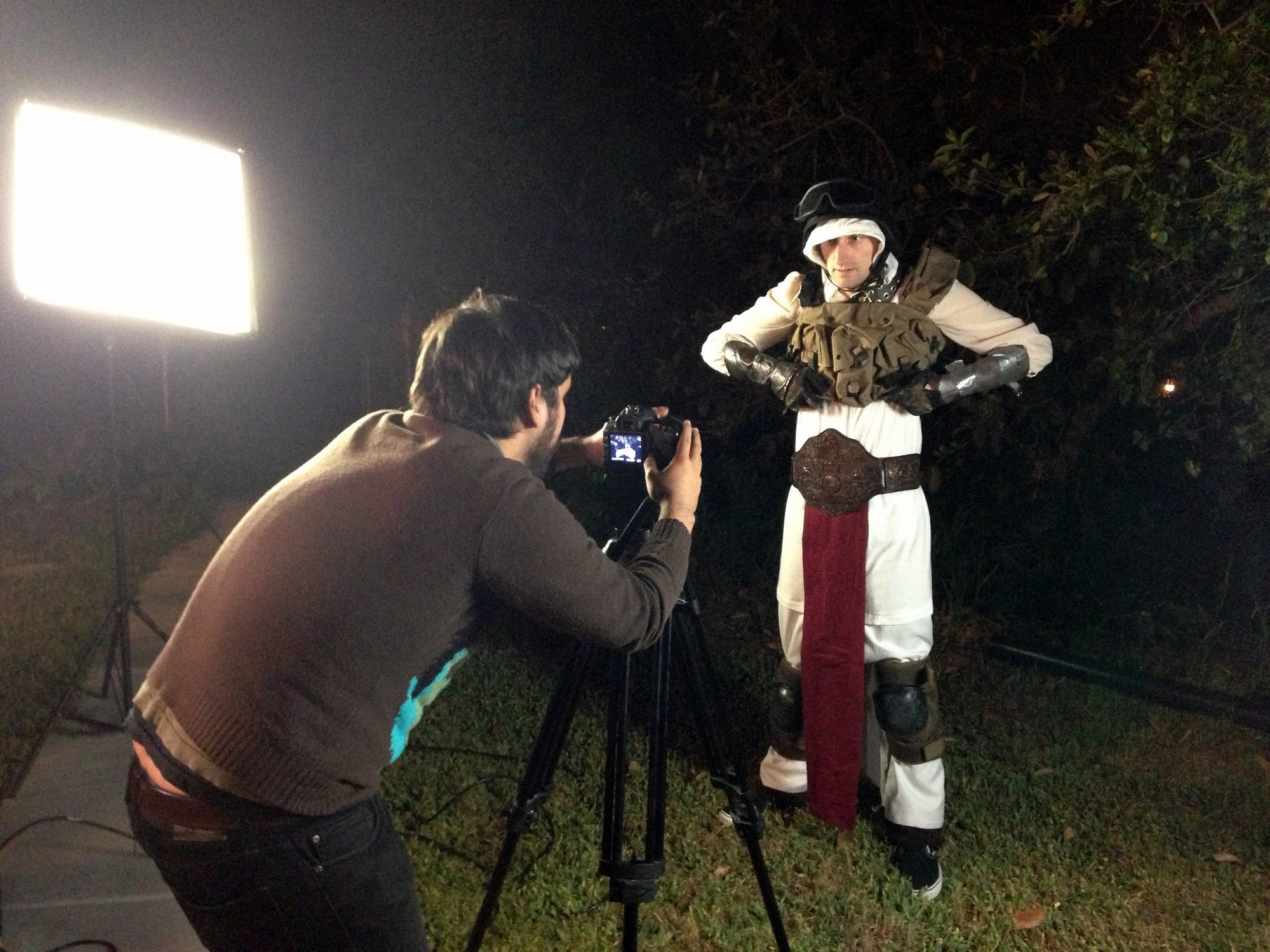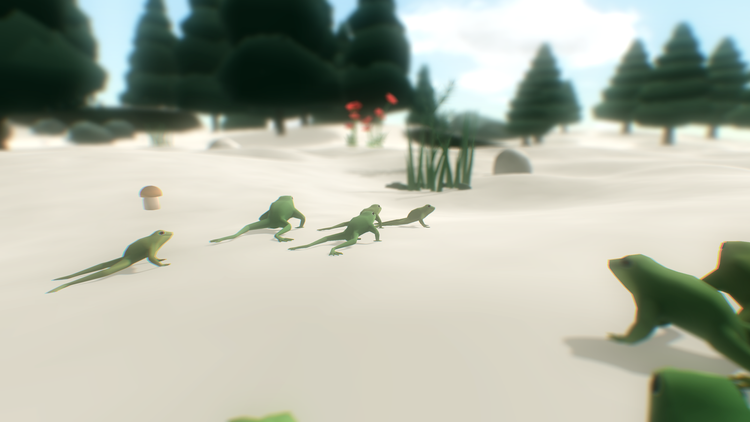Why are videogames so bad at being funny, and why are Mega64 so good at it?

When I started playing Sequence, I thought it’d be the perfect game. A mix between rhythm and roleplaying games? Sign me up. The game begins with the protagonist waking up in a strange house, contemplating whether or not he is dreaming. “Nope,” he announces out loud to himself. “My brain feels like it was stabbed by a hobo. It’s gotta be real.”
My enthusiasm faded faster than a bad metaphor stabbed by a hobo. In order to get to Sequence’s unique gameplay, you must endure minutes of snarky exchanges between its characters. The way each line drips with sarcasm makes the story impossible to take seriously. Why do so many games fail when they try to be funny? Even when a game manages to subvert expectations, these genuinely funny moments are usually few and far between. This lack of sublime humor in games highlights the amount of maturing the medium still needs to go through.
And yet, a group of dudes from San Diego manages to extract the funniness from games, inject it into homemade videos, and turn that into careers. For the past decade, Mega64 has been punking the public and satirizing gaming culture.

During Gamedays, their annual gathering of fans at Disneyland, I talked to the crew—Rocco Botte, Derrick Acosta, Shawn Chatfield, and Garrett Hunter—about this. The pairing was natural for them, they said; they’ve always loved making videos and playing games. When they started their public access show ten years ago, Rocco recognized the clamor for game-related content. “It seemed like the videogame community was way more thirsty for stuff attached to it,” he says. Eventually, their skits caught the eye of more than just videogame fans—Ubisoft and other companies began hiring Mega64 to make promotional content. In addition to their original episodic series, Mega64 continues to regularly produce a variety of video entertainment, including skits, sketch comedy, and a weekly podcast.
Each episode of the original public access show intersperses skits of the guys acting out videogames in public and capturing genuine reactions à la Jackass. Although these segments fit within the context of the show’s storyline, they also work well as standalone videos. Even if you haven’t played the games, these skits reveal a lot about human nature—like just how pissed people can get from a man saying hello to them, or how much people don’t care when two men lie seemingly unconscious in the middle of a Dairy Queen.
Although Mega64 sticks to comedy, they all agree not to create the same type of video over and over again. Their filmography includes everything from a full episode-length musical to two minutes of dick jokes. Even if one video is a hit, they’re not interested in exclusively copying one format. Likewise, consistently increasing their project budget with each video is not one of their goals. They claim that by focusing on making their videos (or “vids,” as they affectionately call them) more grandiose and realistic, they’ll lose their charm. Rocco compares this idea to playing videogames: “It’s ok to make the 80 billion dollar Gears of War 4. That’s cool. I’ll play that. But… Every now and then you need, like, Geometry Wars. You need a detox from that.”
Their filmography includes everything from a full episode-length musical to two minutes of dick jokes.
Shawn says they plan a new video by starting with a game concept and working their way out. “We put ourselves in a box,” he says. “Gaming is our box. It has to be about videogames. How do we get away from that and how do we make a videogame thing a movie?” Mega64 has often been summed up as “Jackass with videogames,” but the breadth of their videos transcends a simple gimmick. Working within limitations often yields a product of great creativity. Comedy is no exception—look no further than 5 Second Films, which doggedly sticks to its title, or The Onion, which long ago transcended being merely a “fake news.”

Mega64, too, is bigger than just jokes: It is internet counterculture. Their brand of comedy relies on taking videogames somewhere unexpected, subverting expectations by not treating the audience as single-minded viewers. As Rocco puts it, they never want their videos to scream, “Hey, Gamers!” Many YouTubers attempt comedy by simply regurgitating references, pandering to the audience in an attempt for more clicks. Mega64 attempts to make all of their videos accessible to everyone on some level. Shawn says he would never want someone to talk to him as if videogames were all he knew, calling that type of behaviour “condescending.” Derrick adds that no one should base their identity off of one single thing. “I identify more with movies and filmmaking than anything else, but I would never want to be the guy who’s like, ‘I’m the movie guy.’ I’m Derrick. I like movies. I like videogames. I like pizza,” he explains. Their multifaceted personalities shine through in many of their videos, merging several interests and styles. They are particularly proud of their Dreamcast Murder Mystery video, which parodies the Dreamcast’s short-lived popularity over a film noir backdrop. This black-and-white sketch uses classic genre tropes—narration by a private detective, a femme fatale, double-crossing, and a plot that doesn’t really make sense. Shawn’s confusion at the end matches Mega64’s feelings about the Dreamcast: “How did such a young and beautiful console die so quick? All the features were there. The world just wasn’t ready.”
“We’re the dumbass. Not you.”
According to Derrick, “A funny video always is basically somebody wants something and they can’t get it. Look at them try so hard to get it and they just fucking can’t.” This theme runs through many of Mega64’s sketches, including Pizzatron, The Update of a Lifetime, and Sit Quitters, not to mention most of their public skits. There’s a deeper root to this theme, though. Freud separated humor into two categories: tendentious and non-tendentious. Tendentious humor requires a victim, but it gets bigger laughs. Derrick says their videos used to be more condescending, until they realized comedy should raise people up and make them feel good. Today, Mega64 makes themselves the real victim. As Derrick says, “We’re the dumbass. Not you.” Regardless, most people would admit that Mega64 has serious nerve to be able to do the things they do in public, and the people that scold them in their videos are not victims, but bullies.

But if videogames are such a rich source of comedy, why are the games themselves so seldom funny? When I ask them, they all agree that their funniest memories from games are unintentional, rather than scripted. Beating the system to unearth unexpected design elements brings the most laughs. Derrick talks about specifically climbing a building in Grand Theft Auto 4 and flinging himself off it to see his avatar land on his face every time. “I always get the most entertainment from exploiting ways the designer messed up,” he laughs. He realizes that his nature to exploit the humor from games might be why he chooses to make videos: “We don’t let the world and a presented project take over our brain and we’re blindly exploring it. No. I know this is a game and I know that there are laws in this game. Fuck what the story is and what you want me to experience. Did you know this character faceplants? Cause I found this out and it’s really entertaining.” Even if this emergent sort of slapstick was designed into the game, it still trumps the sardonic scripts of the games.
“the biggest problem with the world today is that everybody thinks they’re fucking hilarious when they’re not”
They compare most scripted elements in games to humor on the internet. Some jokes just feel like they were written with the intention of them becoming memes. A lot of videogames have trouble getting humor out there because they feel like they have to be bigger and crazier and keep nudging you. “Then it just becomes the guy at the picnic you can’t get rid of. Where it’s like, ‘I just want to fucking eat,’” Rocco says.
“I think honestly, the biggest problem with the world today is that everybody thinks they’re fucking hilarious when they’re not,” chimes in Derrick. “In fact, you should probably never take that opportunity because you’re not funny.” Final Fantasy XIV: A Realm Reborn takes several opportunities to shoehorn pop culture references into questlines for no good reason. It feels as if the localization team expects the player to chuckle at names like “Sharknado” and “It’s Not Lupus,” but these take away from the otherwise sincere atmosphere of the game.

But we don’t always have to be cynical about videogames. Garrett brings up one of his favorite gaming moments. “I can only think of Metal Gear 4 when you return to Shadow Moses Island and it switches back to the PlayStation’s graphics. I was so put back by it that I was laughing out loud. It was such an original idea, but also so jarring, that it made me laugh.” This design choice affects the player so much because it not only subverts the player’s expectations, but it also makes sense within the overall story of the game. Derrick explains this further: “It’s very important to have an air of sincerity and seriousness to your comedy. When you present your joke, it needs to be presented in a way where I say something, it’s wrong. It’s not true, but I really believe it. And that’s what’s funny about it—that it’s presented as truth.” Even if you don’t quite understand the decision to switch the game back to 90s graphics, you know they have a sincere purpose.
Just like Mega64’s videos, the funniest game moments are born from sincerity. Truly subversive moments are woven into the environment and themes of the game; they don’t come in the form of loud jokes from an NPC. Mega64 has lasted as long as it has because the appreciation for their craft translates into their videos. They have a sense of humor about themselves—which many games do—but, more importantly, they make jokes that transcend that referential space. Those looking to be similarly funny could take a few notes.
Mega64 videos can be found on GameTrailers and Youtube
Images via Rocco Botte



